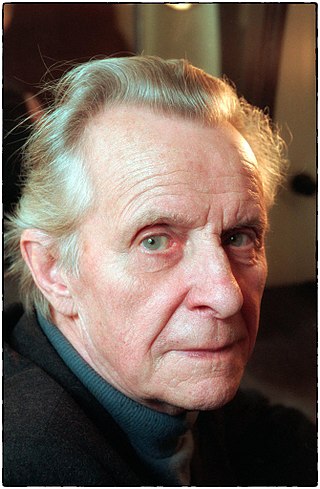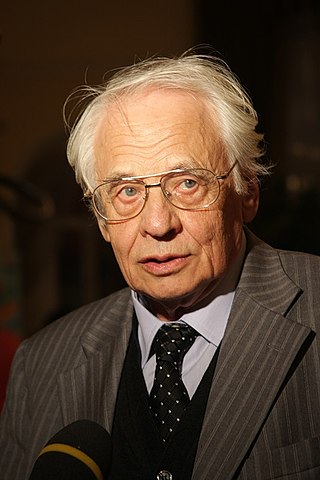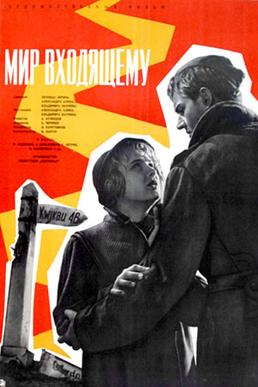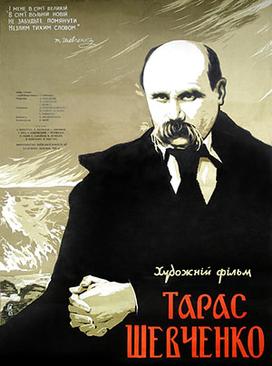
Teheran 43 is a 1981 Soviet-French-Swiss political thriller film made by Mosfilm, Mediterraneo Cine and Pro Dis Film, directed by Aleksandr Alov and Vladimir Naumov. It is based on events around Operation Long Jump, the 1943 attempt by Nazi Germany to assassinate Winston Churchill, Joseph Stalin and Franklin Delano Roosevelt during the Tehran Conference.

How the Steel Was Tempered or The Making of a Hero, is a socialist realist novel written by Nikolai Ostrovsky (1904–1936). With 36.4 million copies sold, it is one of the best-selling books of all time and the best-selling book in the Russian language.
Pavel Grigoryevich Chukhray is a Soviet and Russian film director and screenwriter. He is the son of the prominent Russian film director Grigory Chukhray.

Yevgeny Valerianovich Samoylov was a Soviet actor who gained prominence in youthful heroic parts and was named a People's Artist of the USSR in 1974. He was the father of Tatiana Samoilova.

Vladimir Naumovich Naumov was a Soviet and Russian film director, screenwriter, actor, producer and pedagogue. He was the People's Artist of the USSR (1983).
Igor Andreyevich Savchenko or Ihor Andriyovych Savchenko was a Soviet screenwriter and film director of Ukrainian origin. He has often been cited as one of the great early Soviet filmmakers, alongside Sergei Eisenstein, Vsevolod Pudovkin and Aleksandr Dovzhenko. He is also known for teaching Sergei Parajanov at the Soviet film school VGIK.

Igor Matveyevich Kostolevsky is a Soviet and Russian stage and film actor. He has received the People's Artist of Russia title in 1995. Kostolevsky is best known for starring in the films Teheran 43 and The Captivating Star of Happiness.

Peace to Him Who Enters is a 1961 Soviet war drama film written and directed by Aleksandr Alov and Vladimir Naumov. Set in World War II, it tells the story of three Soviet soldiers who try to rescue a trapped pregnant German woman by taking her on a dangerous drive to a hospital.
Natalya Nikolayevna Belokhvostikova is a retired Soviet and Russian actress. She was awarded the title People's Artist of Russia in 1984.

The Flight is a 1970 Soviet historical drama film, mainly based on writer Mikhail Bulgakov's play Flight, but also on his novel The White Guard and his libretto Black Sea. It is written and directed by Aleksandr Alov and Vladimir Naumov and is the story about a group of Russian Empire's high society refugees from the Russian Civil War, eking out an existence in Istanbul and Paris in the 1920s. It was entered into the 1971 Cannes Film Festival.

Ada Mykolaivna Rohovtseva is a Soviet and Ukrainian stage and film actress. She has appeared in over 30 films and television shows since 1957. Professor at the National University of Culture. She won the award for Best Actress at the 7th Moscow International Film Festival for her role in Hail, Mary!.
The 12th Moscow International Film Festival was held from 7 to 21 July 1981. The Golden Prizes were awarded to the Brazilian film O Homem que Virou Suco directed by João Batista de Andrade, the Vietnamese film The Abandoned Field: Free Fire Zone directed by Nguyễn Hồng Sến and the Soviet-French-Swiss film Teheran 43 directed by Aleksandr Alov and Vladimir Naumov.
Vladimir Alekseyevich Konkin is a Soviet/Russian cinema and theatre actor, who appeared in 45 films. He is best known for his roles in How the Steel Was Tempered and The Meeting Place Cannot Be Changed. Vladimir Konkin, a Meritorious Artist of Russia (2010), is also a published author of short stories and essays.

Taras Shevchenko is a 1951 Soviet biopic about the Ukrainian writer Taras Shevchenko, written and directed by Igor Savchenko. The New York Times praised the acting of Sergei Bondarchuk.

Nikolai Nikolayevich Rybnikov was a Soviet and Russian film actor. People's Artist of the RSFSR (1981).
Dmytro Milyutenko was a Ukrainian stage and film actor of the Soviet era.

Pavel Korchagin is a 1956 Soviet drama film directed by Aleksandr Alov and Vladimir Naumov, based on the novel How the Steel Was Tempered.
The Wind is a 1959 Soviet war drama film directed by Aleksandr Alov and Vladimir Naumov.
Mikhail Yurievich Bleiman was a Russian and Soviet screenwriter and film critic.











